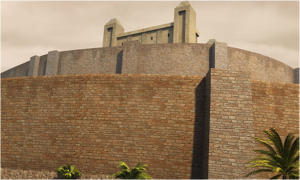The Walls of Jericho
R.J. Evans
 In Joshua 6:1-6, the Israelites were instructed by the Lord to march around the city of Jericho once each day for six days. The priests were told to bear seven trumpets of rams’ horns before the ark, and on the seventh day, they were to march around the city seven times, and when the priests blew the trumpets, all the people were to shout, and the wall of the city would fall down flat. The remainder of chapter 6 tells of their obedience to God’s instructions, the wall falling, and the city being destroyed.
In Joshua 6:1-6, the Israelites were instructed by the Lord to march around the city of Jericho once each day for six days. The priests were told to bear seven trumpets of rams’ horns before the ark, and on the seventh day, they were to march around the city seven times, and when the priests blew the trumpets, all the people were to shout, and the wall of the city would fall down flat. The remainder of chapter 6 tells of their obedience to God’s instructions, the wall falling, and the city being destroyed.
Marching around a city thirteen times in seven days, blowing trumpets and making a great shout — who ever heard of such a thing? The wall was of such considerable size that houses were built upon it (Josh. 2:15). How safe the inhabitants of Jericho must have felt. How easy it would have been for the soldiers and commanders on the walls to laugh and ridicule the marchers as they encompassed the city. But suddenly, on the seventh day, there was an incredible event — the walls fell! (v. 20).
Now, how did the walls fall? Was this some common military procedure that had been used successfully in the past? Absolutely not! “By faith the walls of Jericho fell down after they were encircled for seven days” (Heb. 11:30). Yes, it took great faith to carry out such an unusual command. “For we walk by faith, not by sight” (2 Cor. 5:7). It took faith in “things not seen” — “Now faith is the substance of things hoped for, the evidence of things not seen” (Heb. 11:1). “So then faith comes by hearing, and hearing by the word of God” (Rom. 10:17).
But there are skeptics who laugh and mock at the events recorded in Joshua 6. They say it is absurd to believe that the walls of Jericho fell down after the Israelites marched around them. However, let us consider the following portion of information taken from Halley’s Bible Handbook, New Revised Edition, pp. 159-161:
Dr. John Garstang, director of the British School of Archaeology in Jerusalem and of the Department of Antiquities of the Palestine Government, excavated the ruins of Jericho in 1926-36. He found pottery & scarab evidence that the city had been destroyed about 1400 B.C., coinciding with Joshua’s date, and, in a number of details, dug up evidence confirming the Biblical account in a most remarkable way. “the wall fell down flat” (20). Dr. Garstang found that the wall did actually ‘fall down flat.”
There are many lessons learned from Jericho:
- We learn that God’s ways are not our ways(Isa. 55:8). Man would have planned some scheme to allow a few to enter the city and open the gates or build mounds, use sling shots to pick the soldiers off the wall, use ladders, etc.
- We learn the meaning of grace. “And the Lord said to Joshua: ‘See! I have given Jericho into your hand, its king, and the mighty men of valor’” (Josh. 6:2). Yes, it was a gift, but it involved active obedience. The same is true today — salvation is a gift from God (Rom. 6:23; Eph. 2:8), yet certain conditions must be met (Matt. 7:21; Jn. 6:29; Mk. 16:16; Lk. 13:3, 5; Acts 2:38; Eph. 2:10; Heb. 5:9).
- We learn the meaning of obedient faith(Heb. 11; Jas. 2:24).
- We learn that God’s way will work no matter how foolish (in man’s eyes) it may seem(1 Cor. 1:18-31).
The Apostle Paul told the Romans that “whatever things were written before were written for our learning, that we through the patience and comfort of the Scriptures might have hope” (Rom. 15:4). The Israelites placed their faith and trust in God when they marched around the city of Jericho. We place our faith and trust in God when we are baptized for the remission of our sins (Mk. 16:16; Acts 2:38; 22:16; 1 Pet. 3:21). When we faithfully obey the Lord we can hope for and enjoy the blessings and rewards He has promised (Matt. 6:33; Rev. 2:10). Again, we emphasize — “By faith the walls of Jericho fell down after they were encircled for seven days” (Heb. 11:30).

